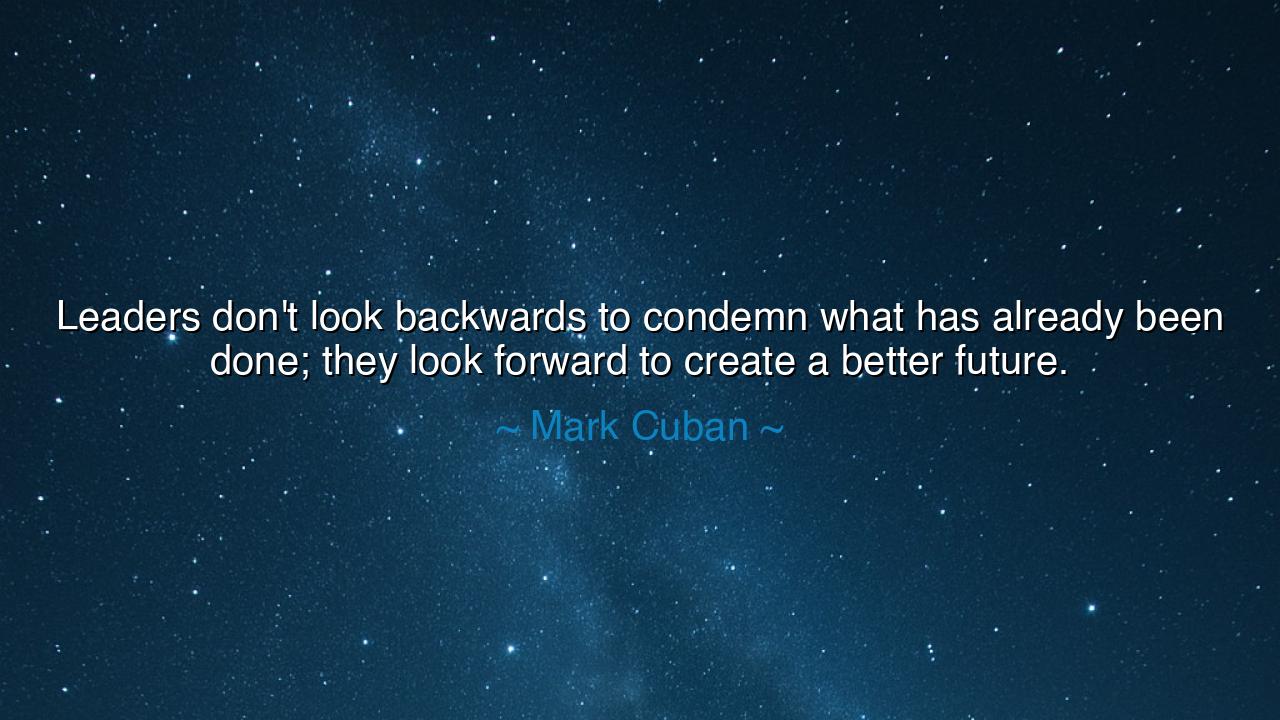
Leaders don't look backwards to condemn what has already been
Leaders don't look backwards to condemn what has already been done; they look forward to create a better future.






In the words of Mark Cuban, we are offered a profound insight into the nature of leadership. Cuban’s statement, "Leaders don’t look backwards to condemn what has already been done; they look forward to create a better future," challenges the common tendency to dwell on the past, on failures or mistakes. Leadership, according to Cuban, is not about assigning blame or lamenting past errors—it is about vision, progress, and the relentless drive to shape the future. A true leader is one who rises above past shortcomings and focuses instead on creating opportunities and solutions that will lead to a brighter tomorrow.
The ancients understood this principle of leadership well. In ancient Greece, the role of the leader was not one of self-congratulation or blame. The greatest leaders, like Pericles, focused not on the mistakes of the past but on shaping a legacy through vision and action. Pericles, who guided Athens through its Golden Age, understood that leadership required a forward-thinking approach, one that embraced the unknown and the unseen, rather than obsessing over the past. Pericles’ speeches, like his famous one after the death of the Athenian soldiers in the Peloponnesian War, emphasized optimism and the need to look ahead, even in the face of tragedy. The strength of a leader, he argued, lies not in what has been done, but in the ability to inspire others to create something greater.
This mindset was also present in the stories of great conquerors like Alexander the Great. Despite his youth, Alexander’s approach to leadership was one of bold vision. His conquests were not driven by a desire to dwell on the successes or failures of previous rulers, but by a desire to forge a new path for his empire. Alexander's leadership was about moving forward, breaking free from the limits of the past to create a new world—a vision that extended far beyond the known world of his time. His leadership inspired those around him to believe in the possibilities of the future, rather than being constrained by the mistakes or accomplishments of previous generations.
The same principles are evident in Mahatma Gandhi’s leadership during India’s struggle for independence. Gandhi, though deeply aware of India’s long history of colonial rule and oppression, did not focus on condemning the past, but rather on transforming the future. He encouraged the Indian people to embrace non-violence, self-reliance, and hope for the future. By focusing on action, integrity, and vision, Gandhi was able to lead his people toward a future of freedom and self-determination, despite the many challenges and scars of the past. His leadership was forward-thinking, based on the belief that a better future could be created, no matter how dire the present or past may have seemed.
Cuban’s words are not only a reflection of ancient principles but are also deeply relevant to the modern world. In the business world, the idea of innovation and future-focused leadership is crucial for success. Consider the example of Steve Jobs, the co-founder of Apple. Jobs was known for his visionary leadership, constantly looking forward to new possibilities rather than lingering on past failures. Even after being ousted from Apple in the 1980s, Jobs returned to reinvent the company, focusing on innovation and product creation. His legacy is a testament to the power of forward-thinking leadership, which is not about perfection or dwelling on what went wrong, but about creating something better for the future.
The lesson here is one of focus and action. Like the leaders of old, Cuban reminds us that true leadership requires us to look forward, to embrace the unknown, and to create the future we desire. Leaders must not be weighed down by the past, whether it is filled with success or failure. They must be willing to learn from history, but not live in it. A leader’s role is to shape the future, to inspire those around them to believe in new possibilities, and to move forward with confidence and purpose.
In practical terms, we must apply this wisdom to our own lives. Whether in our careers, personal growth, or relationships, we should focus on the future—on what can be achieved, on what is still to come. This does not mean ignoring the lessons of the past, but it does mean not allowing ourselves to be trapped by it. Just as Alexander, Gandhi, and Jobs created legacies by looking ahead, we too must take action, create opportunities, and lead with vision. Let us commit ourselves to being leaders in our own lives, looking not to condemn what has been done but to build something even better for tomorrow.






AAdministratorAdministrator
Welcome, honored guests. Please leave a comment, we will respond soon